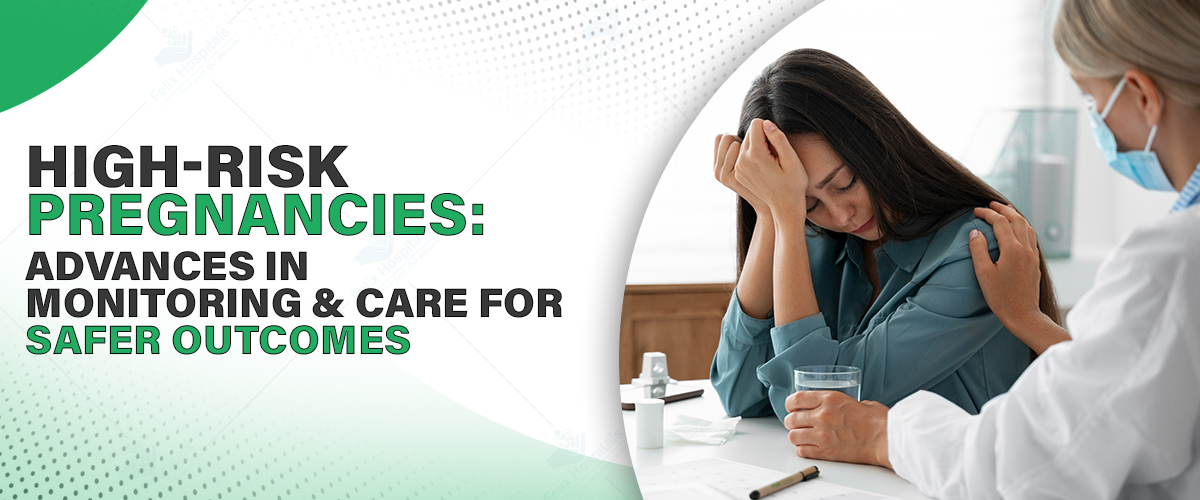
Subscribe to our

Pregnancy is a time of joy and transformation, but for some women, it can come with added challenges. High-risk pregnancies can arise due to health conditions, complications during previous pregnancies, or unexpected problems that develop along the way. While the term "high-risk" can sound alarming, it simply means that extra monitoring and care are needed to protect both the mother and the baby.
Fortunately, improvements in prenatal care have made it possible to manage high-risk pregnancies more effectively than ever before. Whether a pregnancy is considered high-risk due to age, pre-existing conditions, or complications during pregnancy, early identification and continuous care are the keys to managing it effectively.
If you're concerned about a high-risk pregnancy, speak to our specialists today at +91 9667064100 for expert guidance and personalized care.
When there are high chances of complications for the mother and/or baby in a pregnancy, then it is called a high-risk pregnancy. Below are some of the complications that are present in high-risk pregnancies:
Preeclampsia: In this condition, the blood pressure rises dangerously high, which can damage other organ systems, especially the liver and kidneys.
Gestational diabetes: When the blood sugar levels rise during pregnancy, it can increase the risk of premature birth, high birth weight, and other complications.
Preterm labor and delivery: When labor begins before 37 weeks of pregnancy, it can cause various health risks for the baby.
Placental Abruption: This occurs when the placenta prematurely detaches from the uterine wall, resulting in heavy bleeding and compromising the oxygen and nutrition supply of the baby.
Here are some factors that may contribute to a high-risk pregnancy:
Maternal age: Advanced maternal age (35 years of age or older) increases the risk of complications such as gestational diabetes and chromosomal abnormalities.
Medical conditions: Pre-existing medical issues, including diabetes, hypertension, and autoimmune diseases, might complicate pregnancy.
Multiple pregnancies: Women carrying twins, triplets, or more are at a higher risk due to increased demands on the mother's body.
Previous Complications: Women with complications in their previous pregnancies are also at a higher risk.
Genetic factors: Certain genes and family history might increase the risk of problems.
Lifestyle factors: Smoking, excessive alcohol use, and drug use can all increase the chance of complications.
It’s essential to recognize warning signs and seek immediate medical care when it comes to high-risk pregnancies. Symptoms to watch for include:
Severe or persistent headaches
Swelling in the face, hands, or legs
Abdominal pain or cramping
Sudden changes in vision, such as blurriness or seeing spots
Heavy bleeding or unusual vaginal discharge
Decreased fetal movement
Pain or burning when you urinate
Depending on your conditions and symptoms, the doctor might suggest the following tests:
Specialized ultrasounds: Three-dimensional (3D) or four-dimensional (4D) ultrasounds are used to check for any abnormalities. Ultrasound to measure the length of the cervix is performed to determine whether you are at risk of preterm delivery, and a biophysical profile may be required to evaluate the health of the fetus.
Cell-free DNA screening: It examines a blood sample to see whether there is an increased risk of chromosomal disorders.
Amniocentesis: It is used to detect serious conditions known as neural tube defects in the brain or spinal cord.
High-risk pregnancies require close monitoring and tailored treatment. Regular check-ups help manage symptoms and complications. For expert care, visit the best gynecologist hospital in Noida for specialized support.
Visit Your Doctor Regularly: In high-risk pregnancies, it becomes crucial to follow up with your doctor regularly to keep track of your health and your baby’s health.
Gestational Diabetes: Regular glucose monitoring is needed along with medicines to control blood glucose levels.
High blood pressure: Anti-hypertensives (blood pressure-lowering medications) are prescribed along with lifestyle changes, such as limiting salt intake and exercising regularly.
Steroid injections: If there is a danger of premature delivery (especially if before 34 weeks), then steroid injections are given to promote lung development in the baby.
Magnesium Sulfate: It is given to women with severe preeclampsia or eclampsia to prevent seizures.
Early Induction or Cesarean Section: If there are high health risks to the mother or child, then delivery may be induced early or a C-section may be done.
Fetal Intervention: In rare cases, fetal surgery may be needed to treat congenital conditions detected during pregnancy.
To lower the risk of pregnancy-related complications, you should:
Avoid alcoholic drinks, smoking, and taking non-prescription medicines
Maintain a healthy weight before pregnancy
Manage any existing or chronic medical issues you may have
Safe sex minimizes the risk of sexually transmitted infections (STIs)
Have an active and stress-free lifestyle
Having a high-risk pregnancy can make you anxious, but instead of getting scared, you should focus on taking special care before, during, and after your baby’s birth. This includes more prenatal ultrasounds, careful monitoring, and following your doctor’s advice throughout pregnancy to keep you and your baby healthy. While a high-risk pregnancy may come with added challenges, advancements in medical care have greatly improved outcomes for both mothers and babies. By staying informed, following medical advice, and consulting the best gynecologist in Noida, you can navigate these challenges with confidence and care.
Q1. Will I have a high-risk pregnancy if I get pregnant at a later age?
Ans: There are chances of high risk in late pregnancies, but age is not the only determining factor. The doctor will take into account other factors while evaluating if your pregnancy is at risk of complications.
Q2. Can I have a vaginal delivery with a high-risk pregnancy?
Ans: Yes. In many cases, vaginal delivery is safe for women with high-risk pregnancies. However, some women may require a cesarean delivery to reduce the risk of complications for themselves or their babies.
Q3. Can high-risk pregnancies result in premature birth?
Ans: Yes, there are increased chances of premature deliveries in high-risk pregnancies, which can lead to complications for the baby. Women with high-risk pregnancies need careful observation and medical care.